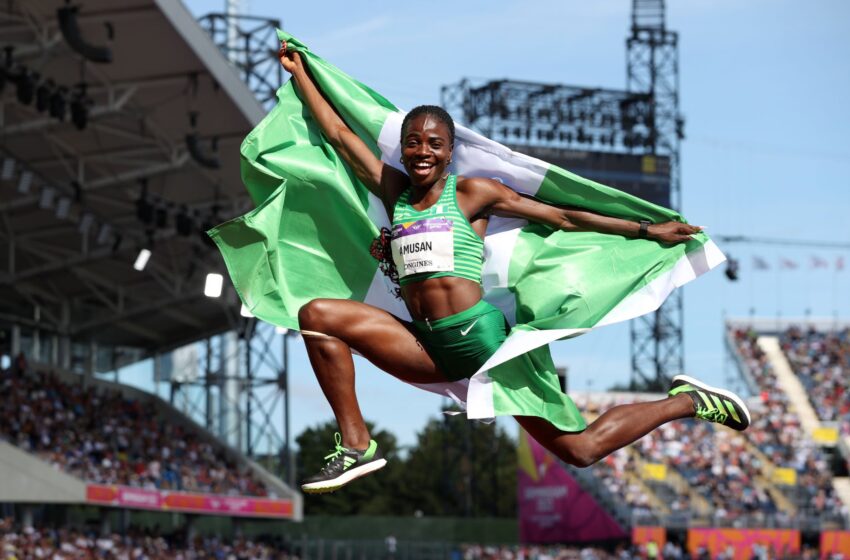Opinion: How Sports Can Address Nigeria’s Insecurity, Promote Peace, Economy

Nigerian sprinter and World 100 meter hurdles champion, Tobi Amusan in celebration withthe Nigerian flag. Photo Credit- Premium Times
Nigeria’s insecurity is deeply rooted in socio-economic inequalities, unemployment, ethnic divisions, and political instability. The nation has witnessed the devastating impact of insurgencies, banditry, and communal clashes. However, sports provide a platform to address these issues in three key ways:
Social Inclusion and Community Building
Sports have a unique ability to bridge divides across ethnic, religious, and regional lines. Through football, basketball, athletics, and other sports, communities can find common ground and build relationships that transcend differences. Organized sporting events can bring together young people from warring communities, fostering dialogue and understanding. For example:
Grassroots tournaments in conflict-prone areas such as the North-East and Middle Belt can act as platforms for reconciliation. Football, in particular, holds sway as a national unifier, with its ability to bring Nigerians together regardless of background. By channeling the energy of young people into sports, governments, and NGOs can divert them from engaging in criminal activities or joining insurgent groups.
Providing Alternatives to Crime
Nigeria’s high unemployment rates have fueled insecurity, with many young people turning to criminal activities as a means of survival. Sports can serve as a productive outlet for idle youth, offering opportunities for skill development, mentorship, and even income generation.
Establishing sports academies in volatile regions can provide at-risk youth with structured activities and life skills training. The sports industry creates jobs not only for athletes but also for coaches, event organizers, marketers, and sports journalists.
Sports inherently teach discipline, teamwork, and respect for rules—values that can counteract the chaotic environments in conflict zones. By instilling these principles, sports can help rebuild communities torn apart by violence.
READ ALSO
Lookman’s CAF Victory: A Story of Embracing Nigerian Heritage
Paris 2024 Olympics: See how our athletes are making history
Lookman, Nnadozie Grab Spotlight in 2024 CAF Awards
Sports as a Tool for Economic Sustainability
In addition to fostering peace, sports can be a driver of economic growth and sustainability. Nigeria’s untapped sports sector has the potential to contribute significantly to the GDP through several avenues:
Investing in sports facilities, such as stadiums and training centers, can stimulate local economies and attract investors. Establishing well-structured leagues for football, basketball, and other sports can create revenue streams through ticket sales, broadcasting rights, and sponsorship deals.
Sports tourism is a burgeoning industry globally, and Nigeria has the potential to tap into this market. Hosting international tournaments, such as the African Cup of Nations or regional athletics championships, can attract visitors, boost local businesses, and enhance the nation’s global image.
Nigerian athletes have historically excelled on the global stage, from football to athletics and boxing. By providing robust support systems for talent development, the country can produce world-class athletes who generate revenue through endorsements, international competitions, and brand partnerships.
Case Studies: Success Stories of Sports Driving Peace and Growth
Rwanda used sports as a cornerstone of its post-genocide reconciliation process. Sports programs and initiatives set up by the government brought together survivors and perpetrators of violence to participate in sports events, fostering healing and dialogue. Additionally, after apartheid, Nelson Mandela leveraged rugby to unite South Africans. Hosting and winning the 1995 Rugby World Cup symbolized the power of sports to bridge racial and political divides.
Nigeria’s national football team, the Super Eagles, has historically united the country during times of political and economic turmoil. The emotional connection Nigerians have with football demonstrates its potential as a peacebuilding tool.
Challenges and Recommendations
While the potential of sports to address insecurity and promote economic sustainability is clear, several challenges must be addressed:
Poor funding and inadequate infrastructure have hindered the growth of sports in Nigeria. However, public-private partnerships should be encouraged to develop sports facilities and programs.
Another is the mismanagement of sports funds and resources undermines efforts to develop the sector. Transparent governance and accountability mechanisms must be implemented in sports administration. Moreover, overemphasis on elite sports has sidelined grassroots development. Regardless, policies should prioritize grassroots sports programs, particularly in conflict-prone and underserved regions.
Conclusion
Sports have the potential to be more than just a source of entertainment in Nigeria; they can be a catalyst for peace, unity, and economic prosperity. By investing in sports development at all levels, Nigeria can address its insecurity challenges while creating opportunities for sustainable growth. The time is ripe for policymakers, corporate stakeholders, and the Nigerian people to harness the transformative power of sports and build a brighter, more united future.

